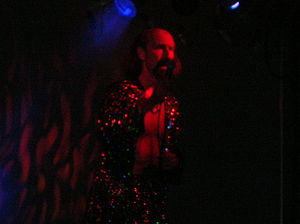Arthur Brown (musician)
- For the Transatlantic aviator, see Arthur Whitten Brown.
The Rev. Arthur Brown, born in Whitby, Yorkshire on 24 June 1944, is a British rock and roll singer known for his flamboyant, theatrical style and significant influence on shock rockers such as Alice Cooper and Marilyn Manson.
History

Brown attended London University and Reading University and studied philosophy and law, but was also interested in taking advantage of his large vocal range of several octaves.
First coming to public awareness in the late 1960s, Brown quickly became known for his outlandish performances, which included setting his head on fire (actually a burning helmet) and performances in the nude. His debut album, The Crazy World of Arthur Brown (1968) was a surprise hit on both sides of the Atlantic. The album included Pete Townshend as producer, and featured a major hit single entitled "Fire" (not to be confused with many later songs of the same title). His group was also called The Crazy World of Arthur Brown and included Carl Palmer (later of Emerson, Lake and Palmer) on drums and Vincent Crane (later of Atomic Rooster) on keyboards.
While on tour in the United States, Brown put on such outrageous stage shows that he was banned from performing in the country - the only musical artist to ever earn that particular distinction.
Though Brown never managed to release another recording as commercially successful as "Fire", he did release three noteworthy albums as Kingdom Come in the early 1970s. (Arthur Brown's Kingdom Come should not be confused with the hard rock/glam band of the same name from the 1980s.) The Kingdom Come albums featured a wild mix of progressive rock and demented theatrics, including Brown's simulated crucifixion. Kingdom Come often performed in full costume with makeup, and photos of Brown from this period clearly show him sporting a distinctive eye makeup scheme that Alice Cooper borrowed. The third and final Kingdom Come album, Journey, is noteworthy for being one of the first (if not the first) rock albums to feature a drum machine.
In later years, Brown released several solo albums and also contributed vocals to the song "The Tell Tale Heart" on the Poe-based concept album Tales of Mystery and Imagination by The Alan Parsons Project. In 1973, Arthur Brown also had a small but meaningful part in The Who's rock opera movie Tommy as "The Priest". Brown moved to Austin, Texas for a time in the 1980's and obtained a Master's degree in counseling. He is also a minister in the Universal Life Church. Brown returned to the U.K. in 1996. In 1997, he re-recorded "Fire" with German band Die Krupps.
The music of Kingdom Come has often been compared with Hawkwind. Brown has had a number of associations with Hawkwind. In 1973, he was one of the performers on Robert Calvert's Captain Lockheed and the Starfighters album, together with most other Hawkwind members of the time. In 2001 and 2002 Brown made several guest appearances in live Hawkwind concerts, subsequently touring with them, though usually billed as a "guest vocalist". In the December 2002 tour, Hawkwind played several Arthur Brown songs from the Kingdom Come era and "Song of the Gremlin" which Brown had sung on Captain Lockheed; this was documented on the Hawkwind Out Of The Shadows DVD.
Brown reunited the surviving members of Kingdom Come in 2005 for a series of one-off concerts in the U.K., performing material from Kingdom Come's three albums. These were reportedly well received.
See also
Richard Wahnfried - Arthur Brown recorded 1 album with this project.
External links
Gig list - an ambitious project to document every live performance involving Arthur Brown.
